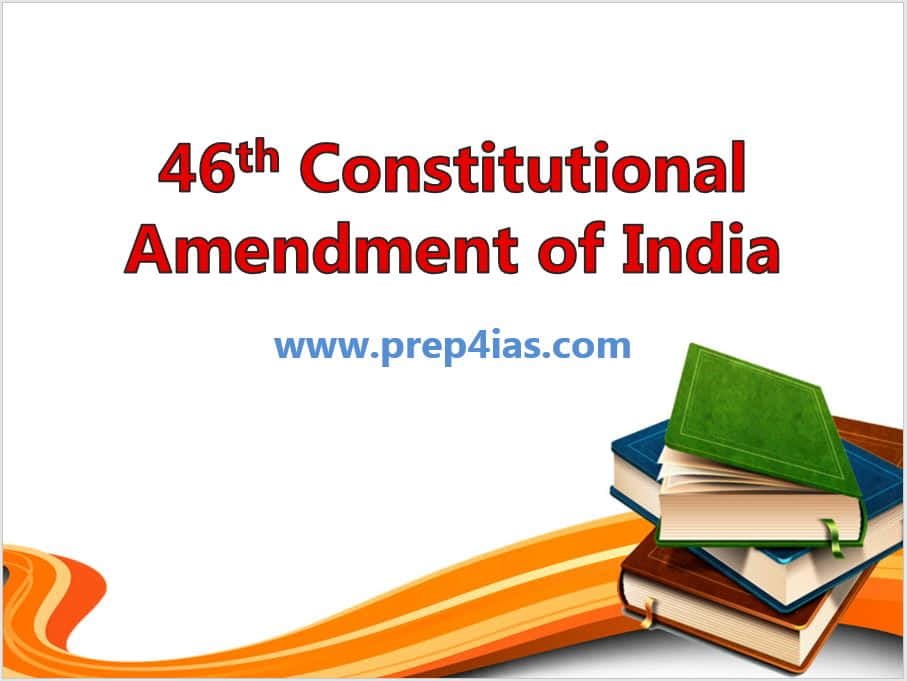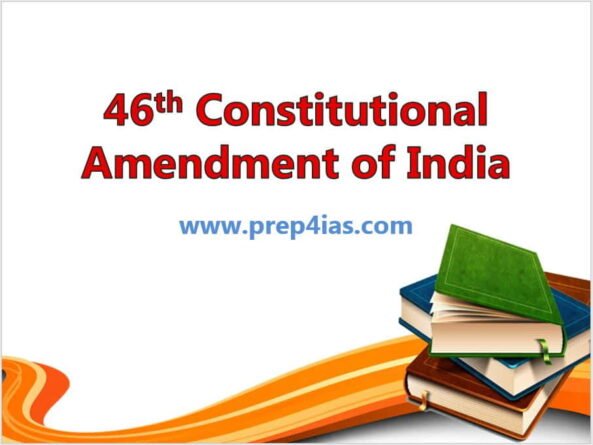In this session, I will take you through Popular Questions on 46th Constitutional Amendment of India which can be asked on most of the Competitive Exams. The 46th Amendment of the Constitution made it possible for the State to levy sales Sales Tax on the price of the goods and materials used in works contracts as if there was a sale of such goods and materials.
In this Land mark decision it has been held, by the Hon'ble Supreme Court that the Sales Tax laws passed by the Legislatures of States levying taxes on the transfer of property in goods (whether as goods or in some other form) involved in the execution of the works contract, are subject to the restrictions and conditions mentioned in each clause or sub-clause of the Art. 286 of the Constitution. More on 46th Constitutional Amendment of India.

46th Constitutional Amendment of India
Also Read: 30 Useful Questions on 73rd and 74th Amendment of Indian Constitution
1. What is 46th Constitutional Amendment is all about ?
Ans. The 46th Amendment of the Constitution made it possible for the State to levy sales Sales Tax on the price of the goods and materials used in works contracts as if there was a sale of such goods and materials.
2. When did 46th Constitutional Amendment enacted ?
Ans. 1982
3. In which case Supreme Court held that the expression "sale of goods" as used in the entries in the Seventh Schedule to the Constitution has the same meaning as in the Sale of Goods Act, 1930 ?
Ans. In Gannon Dunkerley's case
4. Which article is amended in Indian Constitution to insert the clause on "tax on sale and purchase of goods" ?
Ans. Article 366
5. Which entry is inserted in Union List in the Seventh Schedule to enable the levy of tax on the consignment of goods where such consignment takes place in the course of inter-State trade or commerce ?
Ans. 92B
6. Which all articles are amended through 46th Constitutional Amendment ?
Ans. Article 269, Article 286 and Article 366
7. Which subclause was added in Clause 1 of Article 269 of Indian Constitution ?
Ans. (h) taxes on the consignment of goods (whether the consignment is to the person making it or to any other person), where such consignment takes place in the course of inter-State trade or commerce.
8. What is the work substituted in place of "sale or purchase of goods" under Article 269(3) ?
Ans. Sale or purchase of, or consignment of goods
9. Which Clause was inserted in Article 366 after amendment ?
Ans. Clause 29(A)
10. Does a tax on the delivery of goods on hire-purchase or any system of payment by instalments included in Clause 29(A) ?
Ans. Yes
11. Does a tax on the transfer, otherwise than in pursuance of a contract, of property in any goods for cash, deferred payment or other valuable consideration included in Clause 29(A) ?
Ans. Yes
12. Which Clause was amended in Article 286 to enable Parliament to put restrictions and conditions to the system of levy, rates and other incidents on the tax on the transfer of goods involved in the execution of work contract ?
Ans. Clause (3)
13. In which case supreme court took the view that there is no sale as defined in the Sale of Goods Act, 1930 ?
Ans. In the New India Sugar Mills case (A.I.R. 1963 S.C. 1207)
14. In which report, Law Commission of India reviewed the various problems connected with the power of the States to levy a tax on the sale of goods and with the Central Sales Tax Act, 1956 ?
Ans. 61st Report
15. In which case, supreme court reconsidered its earlier decisions with regard to the liability of transfers of controlled commodities to be charged to sales tax as viewed in New India Sugar Mills case (A.I.R. 1963 S.C. 1207) ?
Ans. In Oil and Natural Gas Commission Vs. State of Bihar (A.I.R. 1976 S.C. 2478) Case

